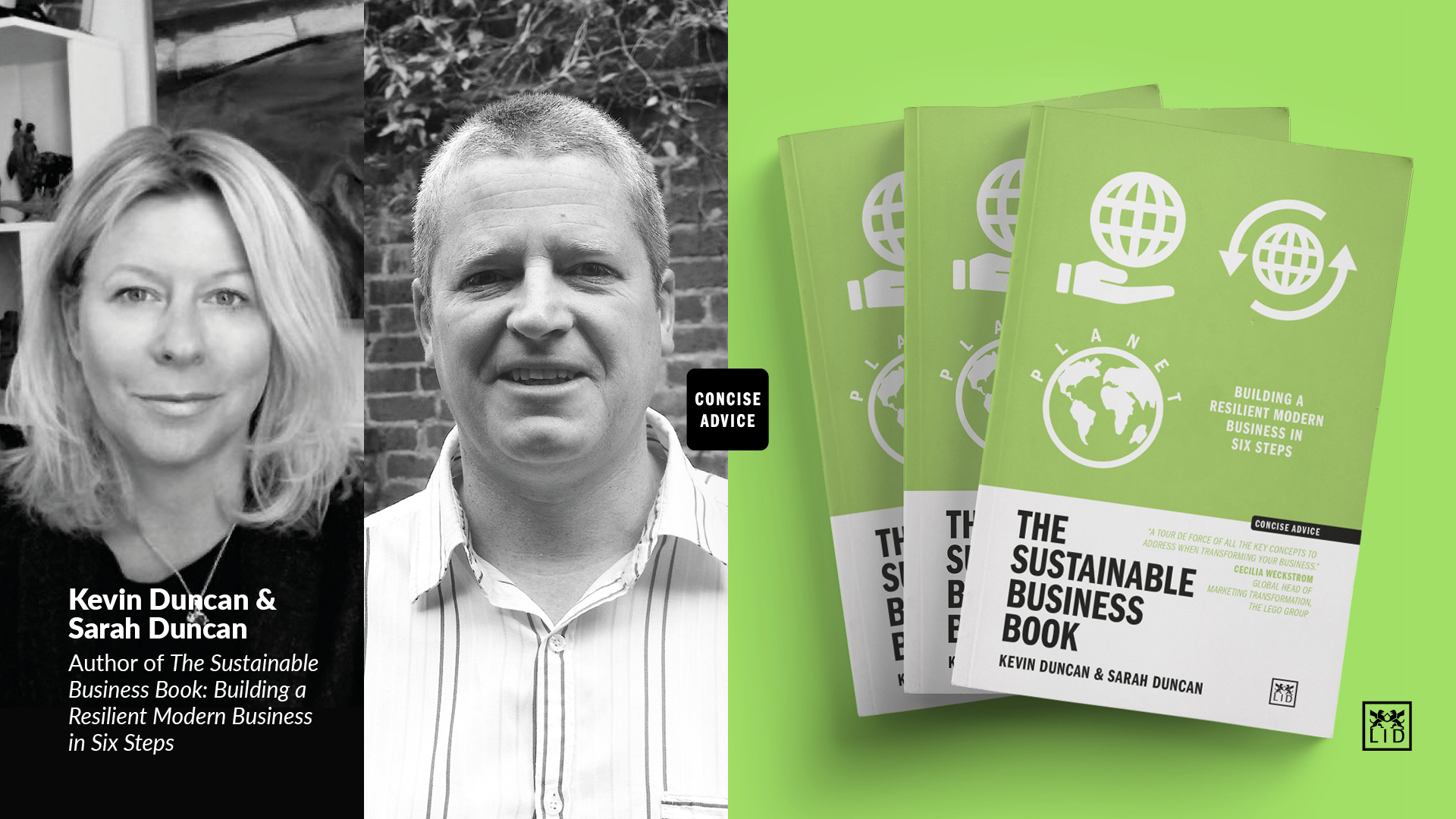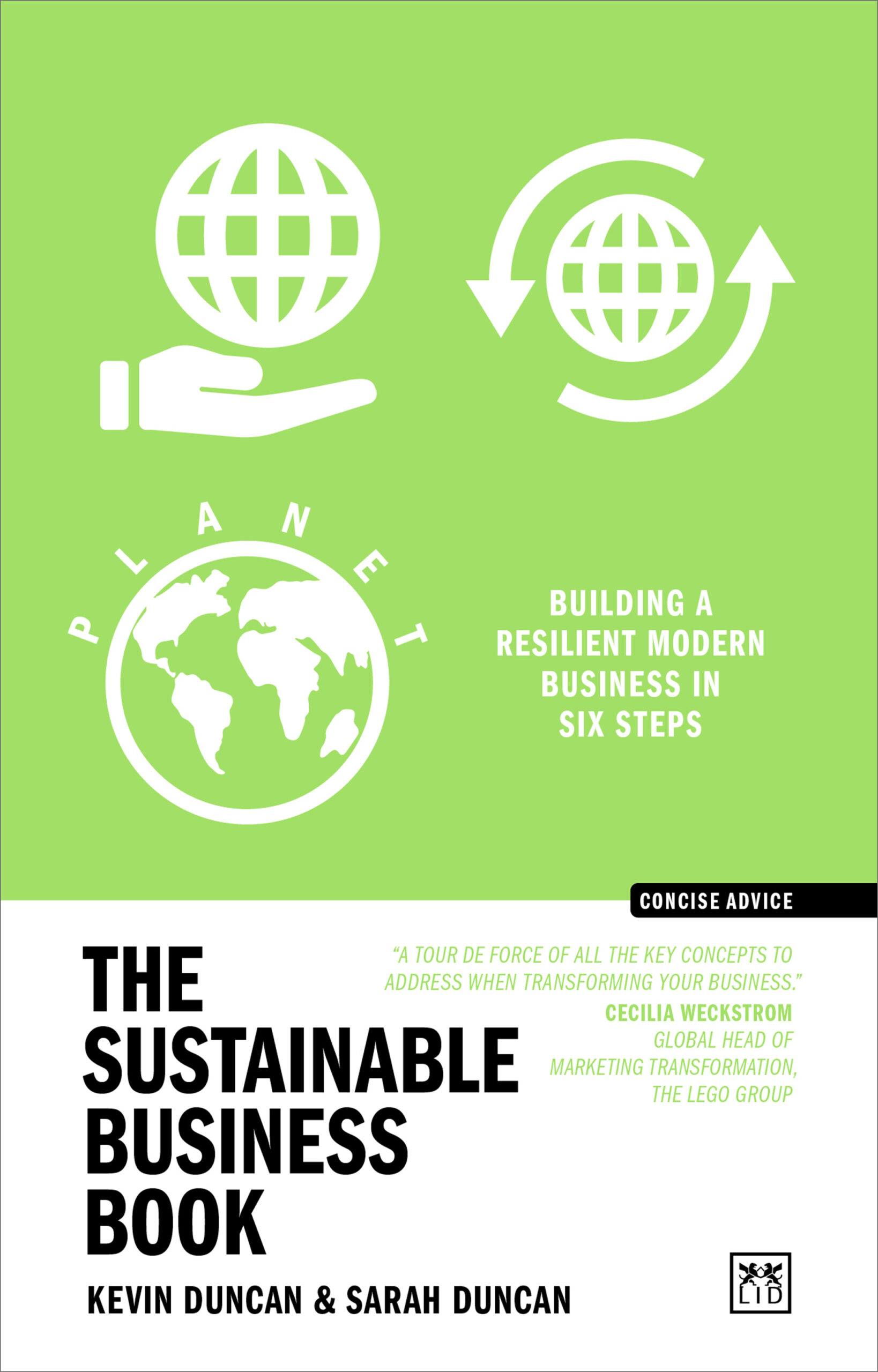|
Why does sustainability need to be an inside job? with Kevin Duncan and Sarah Duncan
Why does sustainability need to be an inside job? with Kevin Duncan and Sarah Duncan

By Guest Contributors Kevin Duncan and Sarah Duncan
Authors of The Sustainable Business Book, Kevin Duncan and Sarah Duncan, tell us how sustainability becomes part of a company’s culture and not just a project.
When it comes to sustainability, many companies make the fatal mistake of viewing sustainability as a ‘project,’ sitting outside the traditional core business structure. This can happen through expedience, or a lack of thought as to where sustainability expertise should fit in the company structure.
Senior executives are usually comfortable with old-fashioned descriptions of disciplines and cost centres such as HR, Marketing, and so on, but they struggle to know where to place sustainability. One lazy default is to keep it well away from other disciplines, to use an external consultant without investing in the discipline long-term, or simply to view it as a one-off project that will never be part of the normal company budgeting structure (Figure 1).
This may create some initial momentum, but it won’t embed the skills necessary in the business for any great length of time. Assuming a company is trying to think longer term, they may well place sustainability within an existing discipline, often HR, Marketing, Operations or even Finance (Figure 2). This approach has the benefit of making sustainability more integral to the business, but it falls down on expertise. In other words, there is no reason why an HR person, or marketing, or finance, should know anything much about sustainability. There are numerous examples of well-meaning executives in these disciplines desperately trying to learn a new topic in a few months flat. This approach is arguably better than nothing, but is prone to mistakes, poor understanding and some naïve or misguided initiatives that are often not a success. It also frequently falls into the trap of focusing on a single issue such as office recycling, whilst continuing to miss the wider picture. And of course, the discipline is still not integrated into the business properly.
In reality, it is a complete change in attitude that permeates the entire operation from top to bottom that makes a company genuinely sustainable. It doesn’t matter whether this is viewed as an overarching philosophy from the top of the organization, or an underpinning operational approach that influences every decision from the ground up. The net effect is the same (Figure 3).
Sustainable thinking needs to permeate all aspects of a business and be thoroughly understood by all employees. Whether you have five or 5,000 people, if you change their behaviour (including your own), then you have changed the company.
To be clear, this is not a case of deviously handing the responsibility for the world’s problems from the company to the individual in the same way that many argue that fossil fuel companies invented personal carbon calculators to make it look as though individuals were responsible for emissions rather than them.
Instead, collective responsibility means making sure that people routinely stop, think and challenge all business decisions, asking questions such as:
• Is there a greener way of doing this?
• Is there a kinder way of doing this?
• Is there a more inclusive way of doing this?
• Is there a more thoughtful way of doing this?
An entire cultural shift is needed to make sure that everything is consistently questioned through a sustainability lens.
This philosophy of sustainability is not a project that has a deep bearing on the organizational structure of a company. It is essential that sustainability becomes part of a company’s culture, providing the bedrock of all its activities or an overarching filter for all decision-making. It is also vital that proper resource is dedicated to it, even if the company starts modestly by engaging an external consultant and then builds its internal capacity to handle sustainability full-time.
If the sustainability function stands alone, or is hidden away within another department, then it will be doomed to failure. There are scores of examples of where this unenlightened approach has left anyone representing the function without any executive authority to enact the change that is needed.
So, sustainability needs to be an inside job.
Don’t do sustainability, be sustainable.
From The Sustainable Business Book by Kevin Duncan & Sarah Duncan
ABOUT THE AUTHORS
 Kevin Duncan is a business adviser, marketing expert, and bestselling author. His books have been translated into over a dozen languages. He is the author of The Diagrams Book, The Ideas Book, The Excellence Book, The Smart Thinking Book, The Business Bullshit Book, The Intelligent Work Book, The Bullshit-Free Book and The Sustainable Business Book (all published by LID).
Kevin Duncan is a business adviser, marketing expert, and bestselling author. His books have been translated into over a dozen languages. He is the author of The Diagrams Book, The Ideas Book, The Excellence Book, The Smart Thinking Book, The Business Bullshit Book, The Intelligent Work Book, The Bullshit-Free Book and The Sustainable Business Book (all published by LID).
 Sarah Duncan is a sustainable business development and ethical marketing consultant. She has been in business for over 30 years and set up her own consultancy, Sleeping Lion, in 2005. She now helps businesses navigate their way through the world of business ethics and sustainability with advice, support and bespoke workshops. She is the author of The Ethical Business Book (LID).
Sarah Duncan is a sustainable business development and ethical marketing consultant. She has been in business for over 30 years and set up her own consultancy, Sleeping Lion, in 2005. She now helps businesses navigate their way through the world of business ethics and sustainability with advice, support and bespoke workshops. She is the author of The Ethical Business Book (LID).
Suggested Reading
 All businesses today face increasing pressure from customers and legislation to improve their sustainability credentials. Moreover, companies’ employees and shareholders are demanding the same. Yet, many companies are playing catch-up and urgently need to get on track for the future. This book explains how companies – small or large – can do that in a series of practical stages.
All businesses today face increasing pressure from customers and legislation to improve their sustainability credentials. Moreover, companies’ employees and shareholders are demanding the same. Yet, many companies are playing catch-up and urgently need to get on track for the future. This book explains how companies – small or large – can do that in a series of practical stages.
The authors adopt a method that asks a series of questions that then require brutally honest answers to, that then go on to develop guaranteed actions for companies to implement. For any business owner or manager who realize the importance of running a sustainable business, but do not know where to start, this book provides an essential springboard. It all adds up to a roadmap towards the next decade – and for businesses to remain relevant and resilient.
